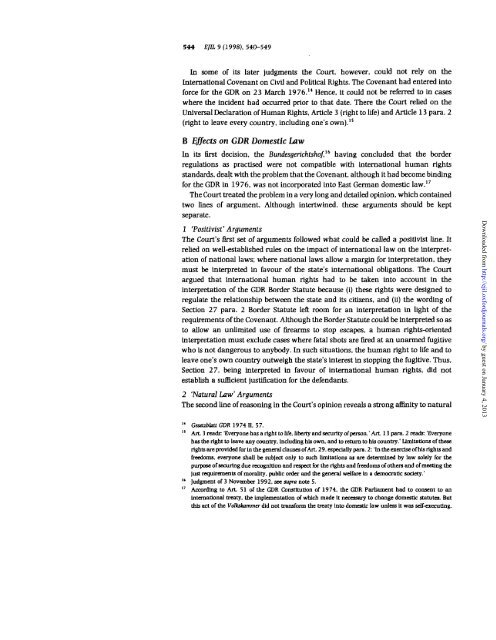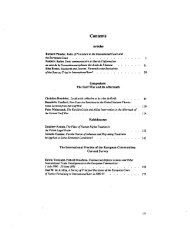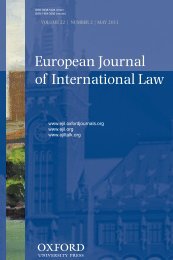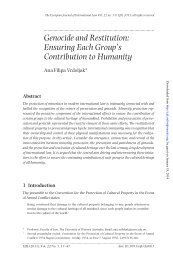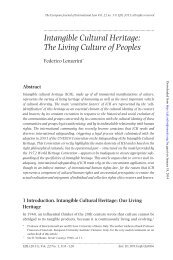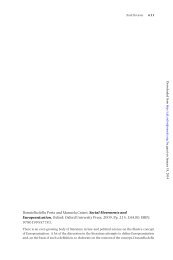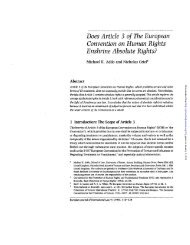The German Border Guard Cases and International Human Rights
The German Border Guard Cases and International Human Rights
The German Border Guard Cases and International Human Rights
You also want an ePaper? Increase the reach of your titles
YUMPU automatically turns print PDFs into web optimized ePapers that Google loves.
544 EJ1L 9 (1998), 540-549<br />
In some of its later judgments the Court, however, could not rely on the<br />
<strong>International</strong> Covenant on Civil <strong>and</strong> Political <strong>Rights</strong>. <strong>The</strong> Covenant had entered into<br />
force for the GDR on 23 March 1976. u Hence, it could not be referred to in cases<br />
where the incident had occurred prior to that date. <strong>The</strong>re the Court relied on the<br />
Universal Declaration of <strong>Human</strong> <strong>Rights</strong>, Article 3 (right to life) <strong>and</strong> Article 13 para. 2<br />
(right to leave every country, including one's own). 15<br />
B Effects on GDR Domestic Law<br />
hi its first decision, the Bundesgerichtshof, lb having concluded that the border<br />
regulations as practised were not compatible with international human rights<br />
st<strong>and</strong>ards, dealt with the problem that the Covenant, although it had become binding<br />
for the GDR in 1976, was not incorporated into East <strong>German</strong> domestic law. 17<br />
<strong>The</strong> Court treated the problem in a very long <strong>and</strong> detailed opinion, which contained<br />
two lines of argument Although intertwined, these arguments should be kept<br />
separate.<br />
1 'Positivist'Arguments<br />
<strong>The</strong> Court's first set of arguments followed what could be called a positivist line. It<br />
relied on well-established rules on the impact of international law on the interpretation<br />
of national laws; where national laws allow a margin for interpretation, they<br />
must be interpreted in favour of the state's international obligations. <strong>The</strong> Court<br />
argued that international human rights had to be taken into account in the<br />
interpretation of the GDR <strong>Border</strong> Statute because (i) these rights were designed to<br />
regulate the relationship between the state <strong>and</strong> its citizens, <strong>and</strong> (ii) the wording of<br />
Section 27 para. 2 <strong>Border</strong> Statute left room for an interpretation in light of the<br />
requirements of the Covenant. Although the <strong>Border</strong> Statute could be interpreted so as<br />
to allow an unlimited use of firearms to stop escapes, a human rights-oriented<br />
interpretation must exclude cases where fatal shots are fired at an unarmed fugitive<br />
who is not dangerous to anybody. In such situations, the human right to life <strong>and</strong> to<br />
leave one's own country outweigh the state's interest in stopping the fugitive. Thus,<br />
Section 27, being interpreted in favour of international human rights, did not<br />
establish a sufficient justification for the defendants.<br />
2 'Natural Law' Arguments<br />
<strong>The</strong> second line of reasoning in the Court's opinion reveals a strong affinity to natural<br />
14 GattxbbOl GDR 1974 U. 57.<br />
'' Art. 3 reads: 'Everyone has a right to life, liberty <strong>and</strong> security of person.' Art 13 para. 2 reads: 'Everyone<br />
has the right to leave any country, Including his own. <strong>and</strong> to return to his country.' limitations of these<br />
rights are provided for in the general clauses of Art. 29, especially para. 2: 'In the exercise of his rights <strong>and</strong><br />
freedoms, everyone shall be subject only to such limitations ai are determined by law solely for the<br />
purpose of securing due recognition <strong>and</strong> respect for the rights <strong>and</strong> freedoms of others <strong>and</strong> of meeting the<br />
just requirements of morality, public order <strong>and</strong> the general welfare In a democratic society.'<br />
" Judgment of 3 November 1992, see supra note 5.<br />
17 According to Art. 51 of the GDR Constitution of 1974. the GDR Parliament had to consent to an<br />
<strong>International</strong> treaty, the Implementation of which made it necessary to change domestic statutes. But<br />
this act of the Volkskammer did not transform the treaty Into domestic law unless it was self-executing.<br />
Downloaded from<br />
http://ejil.oxfordjournals.org/<br />
by guest on January 4, 2013


